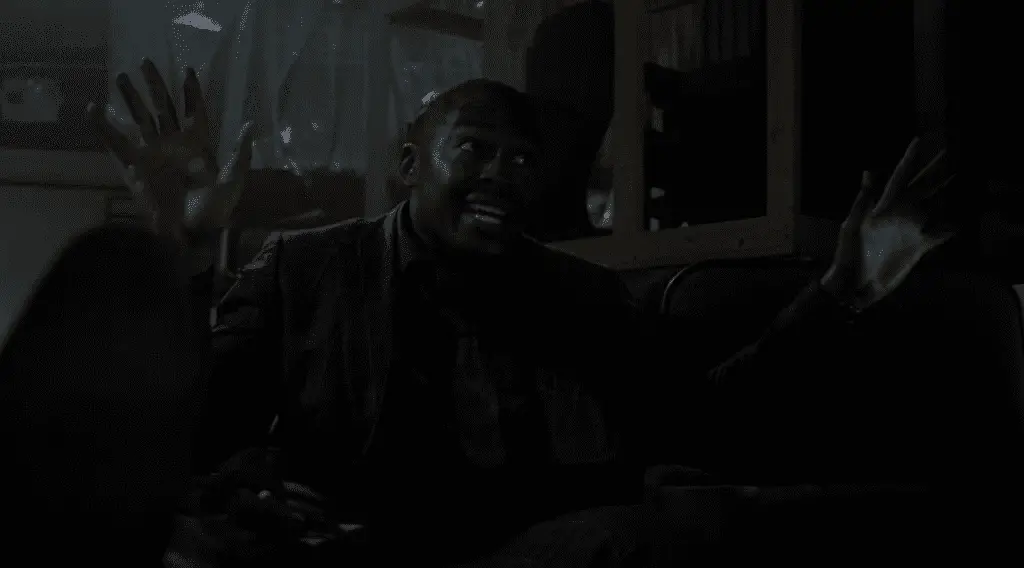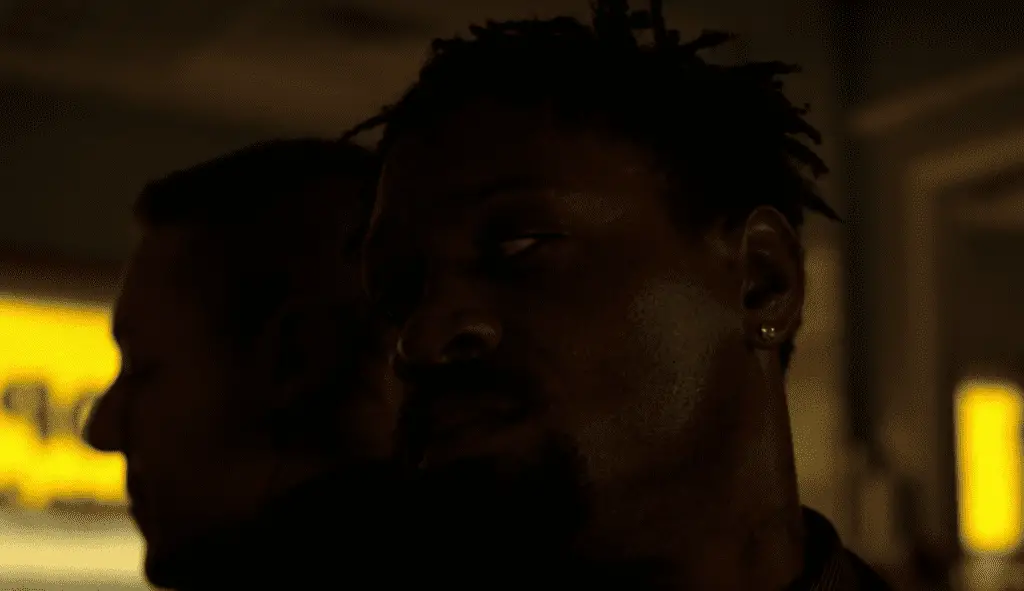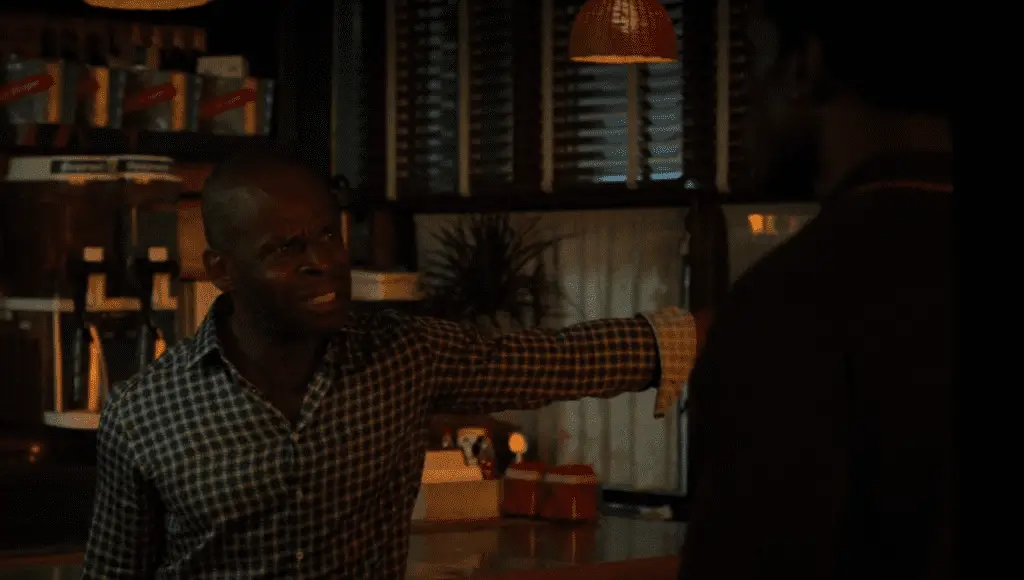Spoiler warnings for Luke Cage season 2
Luke Cage season 2 delivers fascinating character studies alongside its comic book action. As with season 1, this season delves into questions of morality, how to exert power, and whether and how to be a hero. Showrunner Cheo Hodari Coker and the writers deeply explore the psychology and motivations driving the characters in their separate and often conflicting quests for power, serving their communities, and just getting by.
Season 2 further recapitulates many of the themes of season 1, including the nature of power, and specifically the different ways power can be achieved and maintained among marginalized groups: the Black community in Harlem; the Jamaican immigrant community; former prisoners; the children of sex workers. Related to the power theme, the show explores different ways to use that power to achieve the American Dream—to lift up one’s people or just live the good life.
The episode that really took a deep dive into this topic was season 2 episode 6, “The Basement”, written by Aïda Mashaka Croal. In this episode, several pairs of characters debate what constitutes the good life or what one should devote oneself to. After watching the scene in which Shades talks about his plan to achieve the American Dream, I began thinking of this episode as “The American Dream” episode. As the episode which best showcases this theme in the season, I thought it worth a deep dive. Through the contrasting standpoints of the characters, several inter-related dichotomies are explored: a high-risk, high-reward life versus safety and peace; serving one’s community through quiet hard work versus activism; sacrifice for a cause versus self-indulgence.
Piranha

The episode opens with Luke Cage saving Raymond “Piranha” Jones from the Styles’ attack on his party. Holed up in the basement of an abandoned theater, Luke and Piranha have plenty of time to talk. We get to hear Piranha’s backstory for the first time, which brings depth and nuance to a character who originally appears to be pretty shallow—a self-aggrandizing, money-hungry stockbroker.
Piranha grew up closely intertwined with the Stokes crime family. His mother, he tells Luke, was a sex worker in Mama Stokes’ brothel. But Piranha, aided by the Stokes family, had aspirations to make more money and make it in a different way: offshore banking, insider trading, or as Piranha says:
“…The crooked legal ways white folk get down when it comes to protecting their green.”
Piranha holds up Mariah as a figure he admires. She is someone who bridges the gap between the Stokes’ traditional ways of doing organized crime and legit, “respectable” ways of getting rich. He says Mariah is “bougier than Lawrence Otis Graham,” a successful corporate attorney and author, “but she’s got the tenacity of Frank Lucas,” the infamous drug trafficker portrayed in the film American Gangster.
Piranha’s goal in life has been to achieve money and power in ways that the white men of the 1% do without (usually) any consequences. When Luke says insider trading is illegal, Piranha points out that “everyone does it.” Piranha knows full well that Wall Street types, overwhelmingly white guys, get away with murder. More often than not, they even come out of scandals like the financial crash of 2008 unscathed and filthy rich.
Piranha was influenced by a banker who was one of his mom’s clients, and is strongly hinted to have been his father. The banker left a book behind that Piranha has taken as a bible of sorts: Why Should White Guys Have All the Fun. This is a real-life book by Reginald Lewis, an entrepreneur and one of the wealthiest Black men of his time. Piranha’s approach is to follow the teachings of that book. He has devoted his life to getting rich the Wall Street white-guy way.
In a moment of honesty and vulnerability, though, Piranha admits that the best part about being rich is paying all his mother’s bills, being a part of her life, and taking care of her. He says, “I’m my own father.” Piranha’s father abandoned him and his mother. But Piranha made enough money to not only turn his father away when he asked for help after losing everything in the stock market crash, but also step in and take care of himself and his mother. This scene shows us the deeper, emotional motivations behind Piranha’s quest for wealth, and also ties in the theme of family that permeates this season.
Shades and Comanche

In the same episode, Hernan “Shades” Alvarez and his right-hand man, Darius “Comanche” Jones stake out Pop’s barber shop, reasoning it’s the place Luke Cage might bring Piranha. They have a conversation that echoes that of Piranha and Luke, and others throughout this episode; it centers on ideas of what makes the good life, while revealing important backstory and motivations in the characters.
At this point in the season, Comanche has been questioning Mariah’s leadership constantly. The fact that she is in charge clearly grates on him, and in the Pop’s scene, we find out more about why. First of all, Comanche thinks Shades is a brilliant leader and has more experience in the criminal world than Mariah. Comanche does not trust Mariah’s judgment. Secondly, their conversation reveals for the first time that Comanche and Shades had a romantic and sexual relationship in prison. There is reason to think they still love each other, and Comanche reasonably resents Shades’ new relationship with Mariah. As Cheo Hodari Coker has explained, this kind of love triangle is an implicit trope in many gangster stories. He has brought a lot of power to this particular storyline by making it explicit.
Shades explains to Comanche exactly why he’s devoted to Mariah. When he watched her murder Cottonmouth in season 1, who Shades agreed had to go, he realized “she has ice in her veins.” He thinks she will handle the Stylers (the Jamaican gang now led by Bushmaster) with similar calculating, effective violence.
Also, Shades has been thoroughly won over by Mariah’s vision of going legit. In their conversation, it becomes clear that Comanche and Shades have different ideas of the American Dream. Comanche has strength, confidence, and money—“a loaded gun, a hard dick, and a pocket full of cash”—and figures you can’t get more American Dream than that. But Shades thinks there is more. He explains Mariah’s goal: a life in which you don’t have to look over your shoulder all the time. The money and power, but without the danger to life and limb that comes with being in crime. In a way, it’s the same goal that Piranha talked about: having lots of money but doing it in a way that’s legal (or at least overlooked by the law) and acceptable to society at large.
Shades suggests that Comanche is stuck hanging on to a sense of self from prison, as a gangster; he wants Comanche to think beyond that. Here, we start to get into double meanings of Shades’ “going straight.” Shades has not forgotten about the relationship they had, as Comanche accuses him, but he tries to dismiss it as just a prison thing. He claims “prison has its own set of rules,” and everything is different now that they’re outside. Comanche counters,
“I ain’t different. Inside, outside—I am who I am, B.”
This is a conversation about sexual orientation and about love. Shades is claiming that, at least for him, same-sex relationships are specific to prison; Comanche says his sexual identity, and his love for Shades, is constant wherever he is.
And yet, Shades ends by telling Comanche that Shades would die for him, and that will never change. Shades still loves Comanche, but he does not see having Comanche as a romantic partner as an option for him on the outside. One take on this is that Shades’ dream of legitimacy and respectability—leaving the prison life and the gangster life behind—includes, for Shades, disavowing his bisexuality and forgoing a relationship with a man he loves. Shades is with Mariah for many reasons. Attraction and admiration are certainly part of it; he loves Mariah, too. He has been thoroughly won over by Mariah’s vision of an American Dream for them. But he also, tragically, sees that American Dream as being a necessarily heterosexual one.
Anansi and Bushmaster

John McIver, who goes by “Bushmaster”, and his uncle, Paul “Anansi” Mackintosh, have an argument in Gwen’s Café that also touches on the good life and the American Dream, specifically as it relates to immigrants and the Jamaican community in particular. Anansi is furious about Bushmaster’s recent action to leave the severed heads in Mariah’s community center as a message to her. Anansi doesn’t disagree with Bushmaster’s revenge quest against Mariah, but he names the severed head incident as terrorism, and argues that it harms the Jamaican people by associating them with such acts in the public eye. Anansi focuses on the precariousness of an immigrant group like theirs: “We come here with nothing, and build everything up from scratch.” He is worried about Jamaicans being “sent back,” which is a well-founded fear.
At another point in this episode, Captain Tom Ridenhour warns Misty Knight that if the violence in Harlem gets bad enough, the feds are going to be called in, including ICE. Misty expresses the concern that ICE will just round up every Jamaican they find. Anansi’s fears resonate with the audience even more now, when the situation for immigrants in America has gone from precarious to terrifying.
Anansi is afraid that mainstream America will “turn on us,” the “us” being Jamaican immigrants. Bushmaster says that America has already turned on them. Bushmaster takes the position that their community is already oppressed to the point that they can’t be oppressed any further. He thinks only violence is the answer; it’s time for their oppressors (the Stokes family in particular) to finally face consequences. Anansi argues passionately that Bushmaster should put the past behind him. He thinks the right mission is to instead “build something for the next generation.”
Anansi and Bushmaster are having a version of an argument we see pop up in other superhero stories, as well as in real life. Real-life activists, of course, are not bullet-proof or super strong and do not behead people. But putting aside the supervillain factor, Anansi and Bushmaster’s argument echoes tensions that come up regarding activism and justice for marginalized groups. Some argue that the duty of their community is to keep their heads down, work hard, blend in—to play by the rules of mainstream America. Others want to challenge those rules, which are usually profoundly unjust. Challenging the system, though, immediately puts you in the spotlight and in danger; we see this in recent real-world events, for example immigrant activists being threatened with deportation after speaking out.
Anansi and Bushmaster’s argument also echoes the conflicting perspectives of Black Panther and Killmonger in Black Panther. Killmonger wanted revolution against the colonizers and oppressors of Black people worldwide, and he wanted to use the resources of Wakanda for the revolution. T’Challa, the Black Panther, objects not only to Killmonger’s violent methodology, but to the idea of opening up Wakanda to the world. At the start of the movie (before his perspective evolves), his goal is just to protect Wakanda from being colonized itself. Keep quiet, keep hidden, take care of one’s own. The tension between those two perspectives is one that interesting stories in TV and film will no doubt continue to explore, in as much as it reflects tensions and perspectives in the real world.
—-
There are other conversations about the American Dream and what constitutes the “good life” throughout the episode. Misty Knight struggles with the urge she had in a previous episode to plant evidence so that she could arrest someone she knows is guilty. She makes the decision (at least for the time being) to turn in her badge because of this. She knows that her passionate sense of justice often makes her too impatient to go through the bureaucratic rules needed to be a lawful cop, which is part of why she keeps turning to Luke Cage to get detective work done unofficially. Though she returns to the police force in a later episode, her thought process and her decision in this episode helps set up a possible future plot arc of Misty becoming one half of the Daughters of the Dragon. She already thinks and operates more like a superhero than a cop.
Finally, Luke faces off against Bushmaster on High Bridge, and the conversation they have also touches on the “good life” and what one should devote oneself to. After Bushmaster acknowledges the high cost of revenge (which will turn out to be horrific, to his loved ones and his own health), Luke asks him, “Don’t you wanna live your own life?” But Bushmaster argues that there is something larger than living a quiet, happy life that he is seeking. He wants justice for his ancestors, and he has chosen to sacrifice his own peace and well-being for that.
Luke answers with his own sacrifice: Luke would love to have the peaceful life Bushmaster scoffs at—love, family, children. In fact, he is still mourning the loss of Claire, who walked away from him precisely because being a hero was making him too angry, too much in danger, and also dangerous. But, as Luke puts it, he can’t have that peaceful life as long as there are supervillains like Bushmaster. Luke’s sense of duty and responsibility draws him into using his powers to protect the innocent, even though he continually feels ambivalent about his own status as a hero.
This ambivalence and tension—between what Luke wants for himself versus his sense of duty—eventually plays out shockingly in the final episode of the season, with Luke making further and further sacrifices to his values in order to protect Harlem. The moral calculus is complex, and Coker and the writers boldly end the season on a note of tension and ambiguity. Neither Luke nor the audience are very comfortable with the decision Luke made.
That ambiguity is exactly what makes Luke Cage such a great show. Via deep explorations of the characters, especially in dialogue with each other, the show pits different ideas of “the good life” against each other. The show makes the viewer think deeply. Watching this show, we consider many different perspectives, a lot of moral ambiguity, and decisions that aren’t simple, all within the context of fascinating characters and the satisfaction of a good comic book story.

